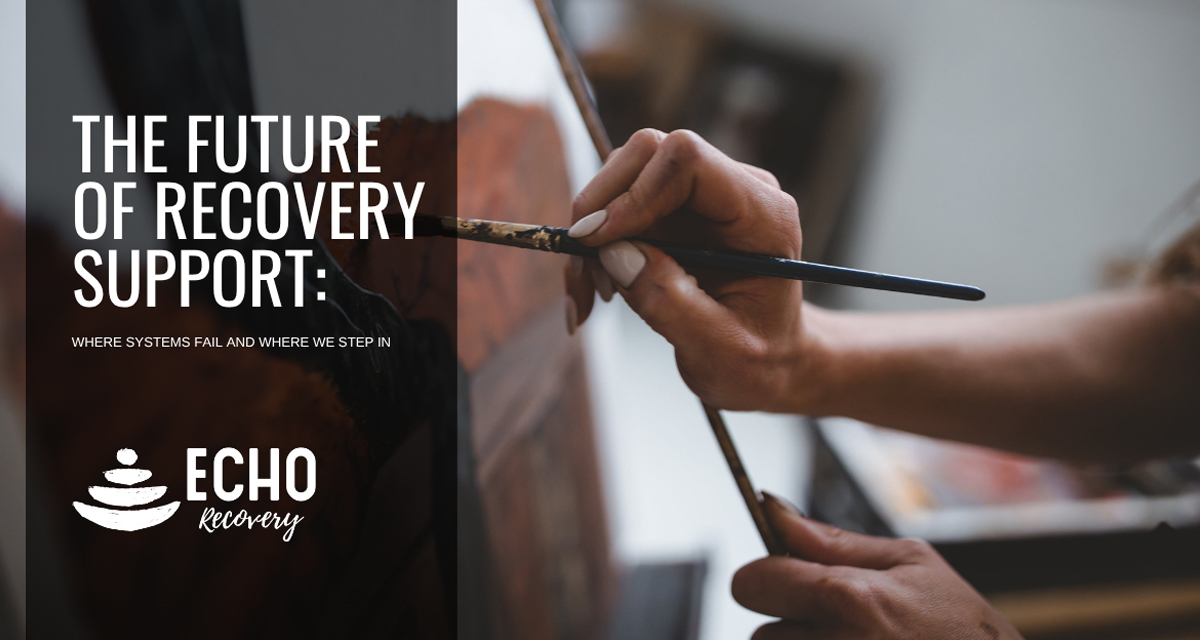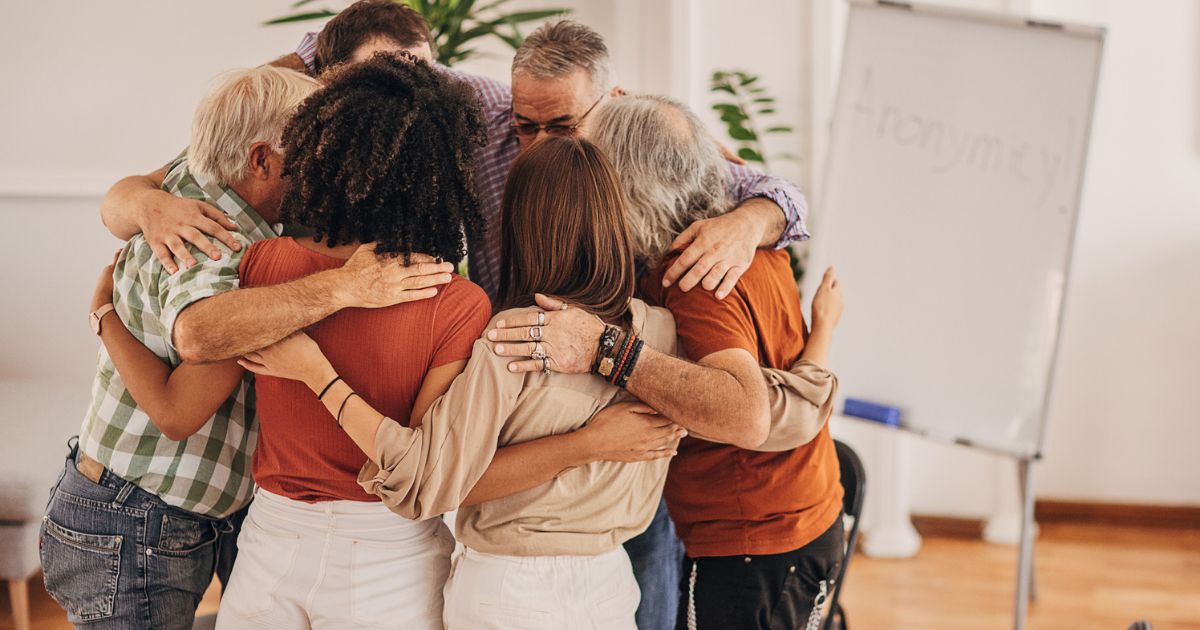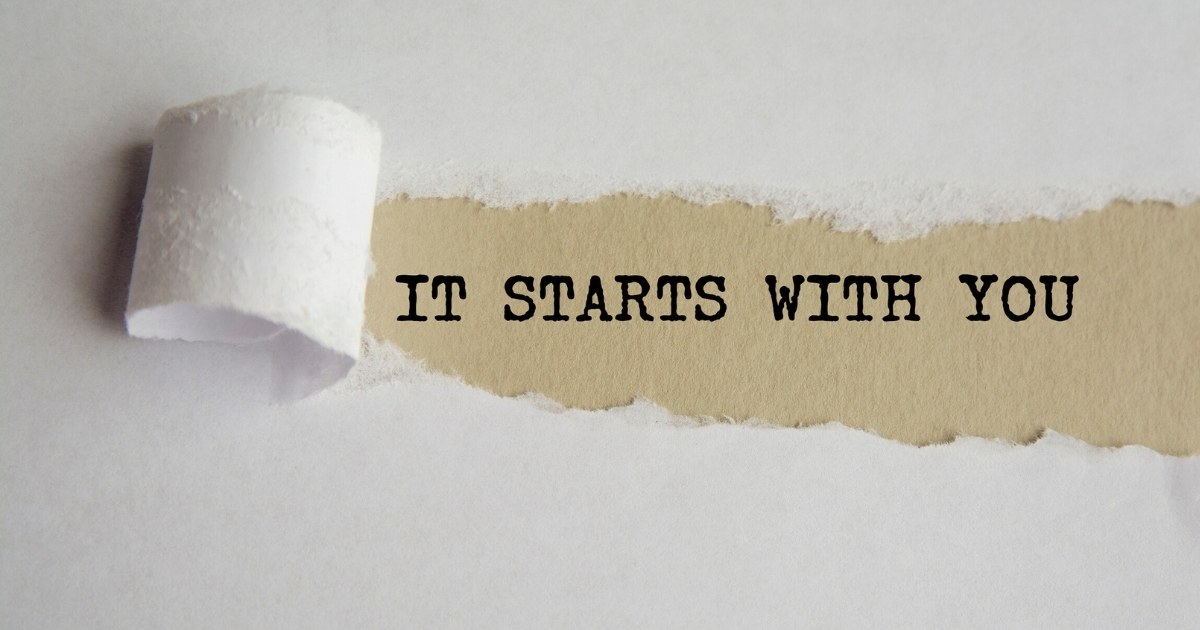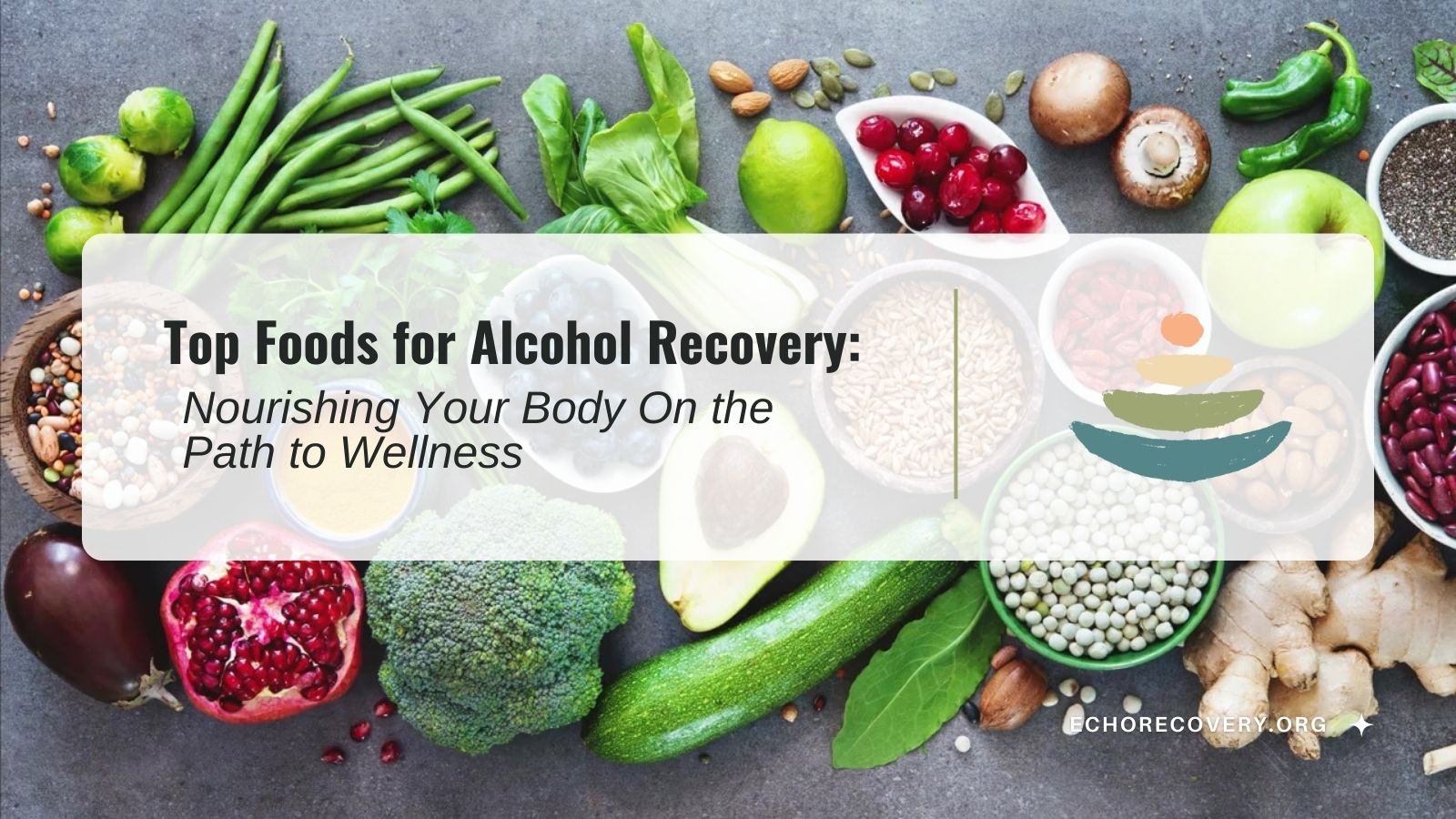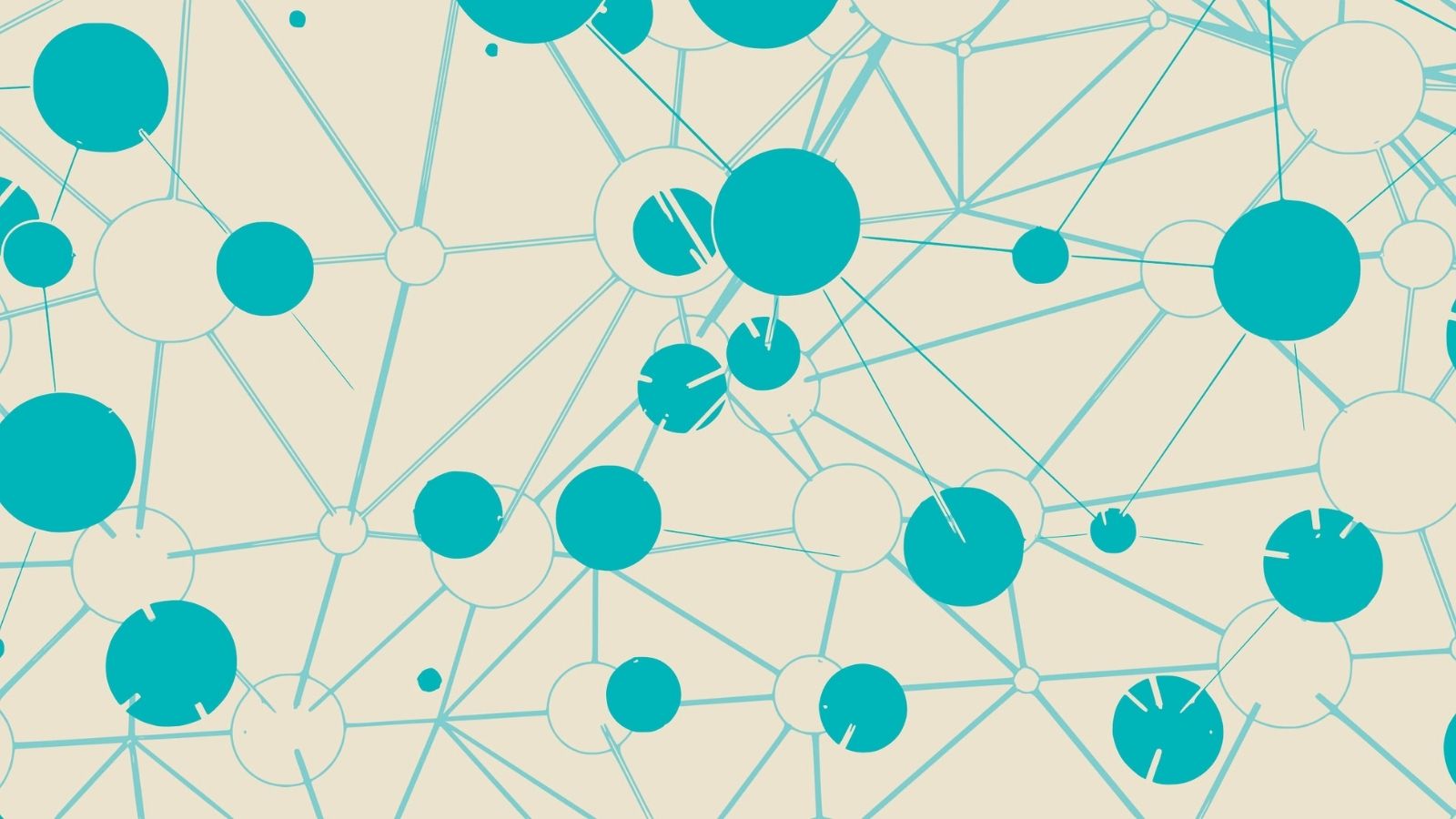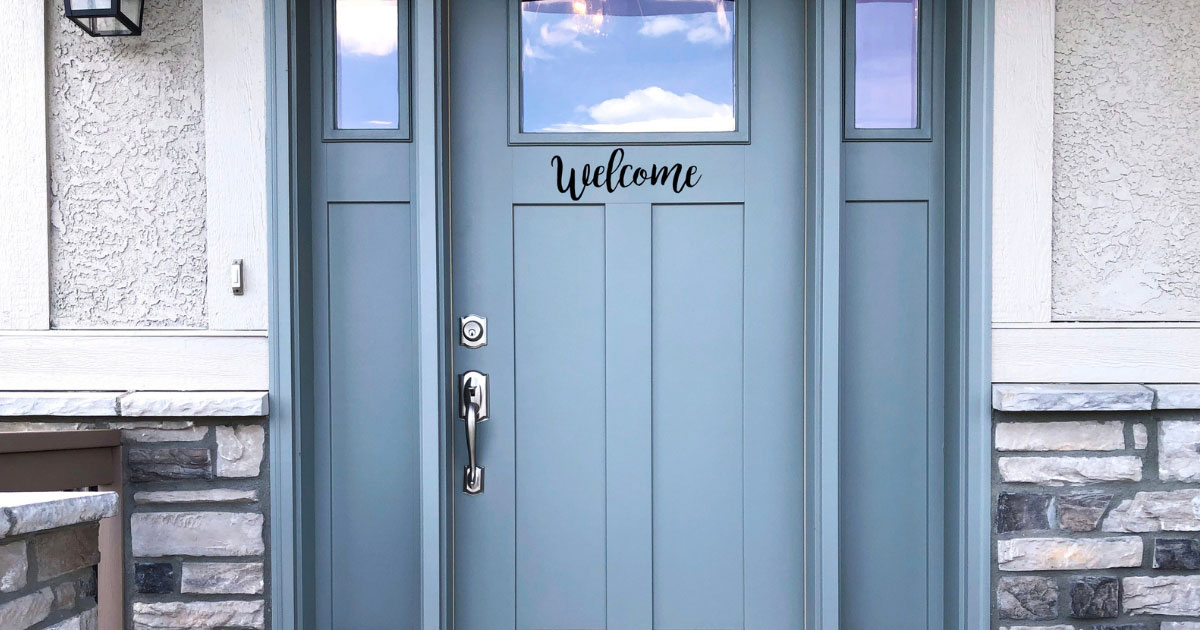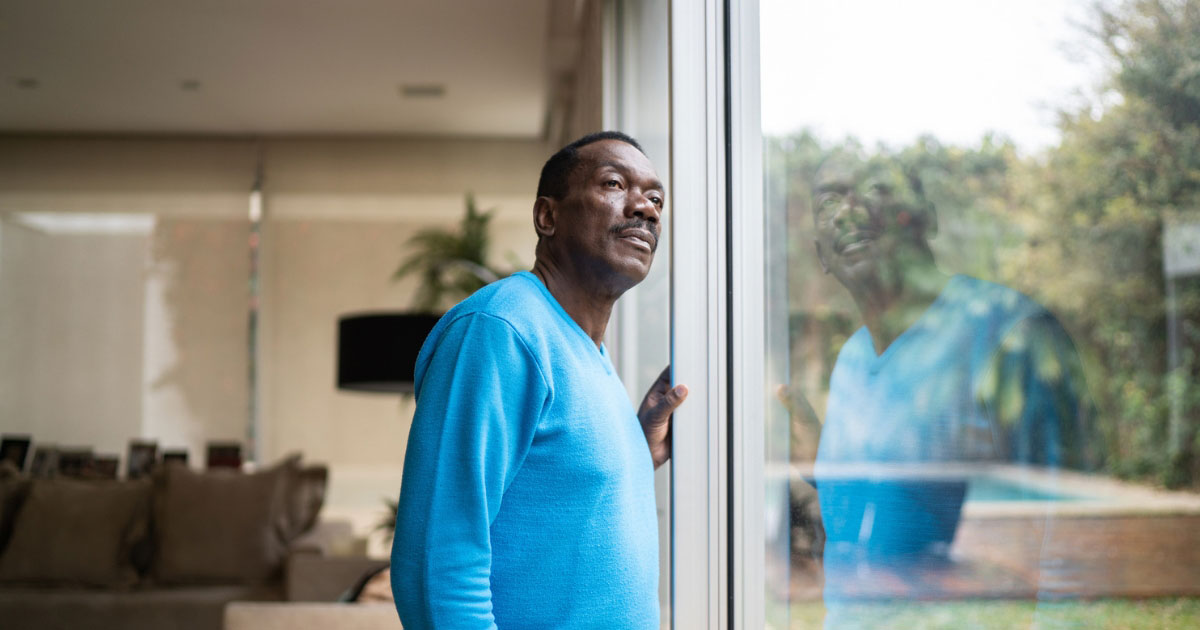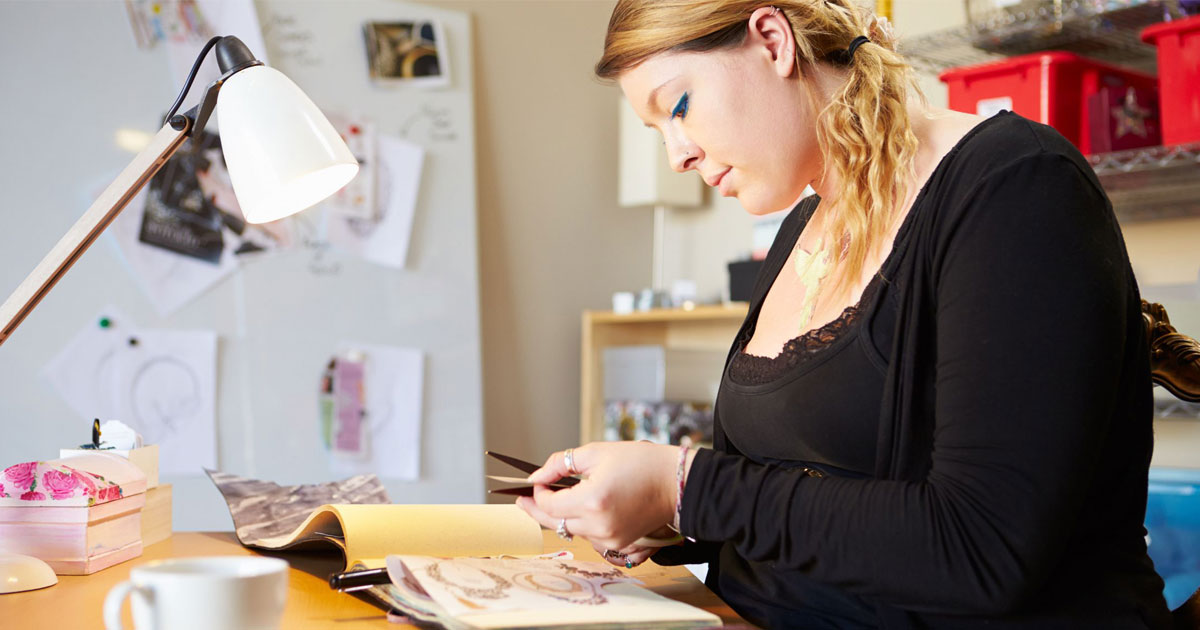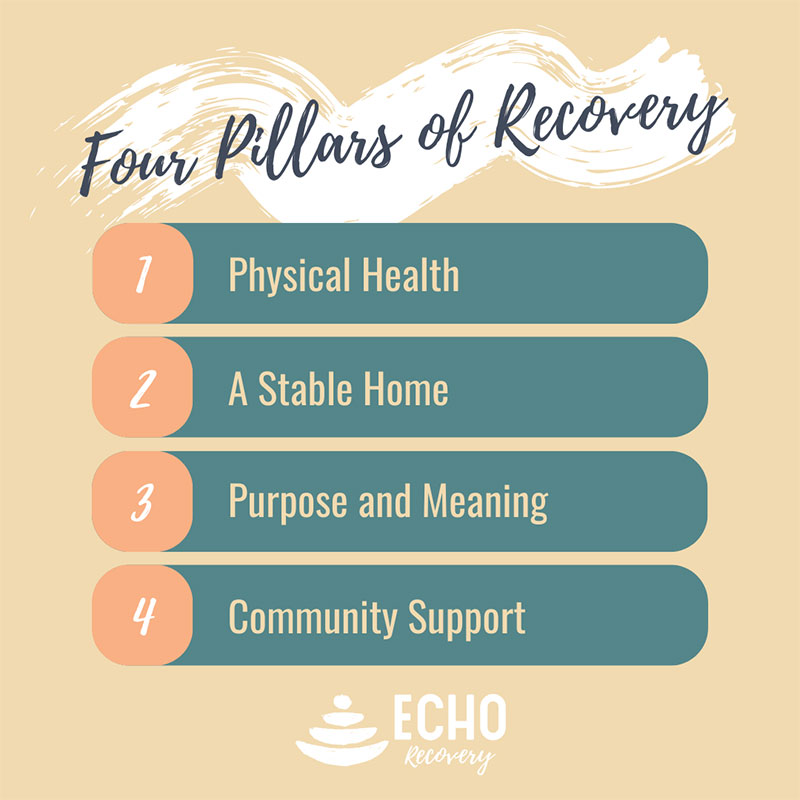There is a long history of fits and starts, failed attempts, and questionable perspectives when it comes to substance use disorder (SUD) treatment. Unfortunately, some of these issues still exist today. A lack of long-term support, poor funding, limited insurance options, and a one-size-fits-all approach to care hold people with SUD back from recovery.
As someone who’s faced many ups and downs on my own recovery journey, I know how difficult it can be to find an approach that works.
A Broken System Still Dominates
It can be extremely challenging to find alternative options to the standard addiction recovery systems. That’s why we created East Coast Housing Opportunities, or “ECHO” for short, so you can discover the success you and your loved ones have been searching for. Many individuals fall through the cracks of impersonalized care, underscoring the need for a more effective system to address SUD. This is precisely what you’ll find with ECHO, where we connect people struggling with SUD to nonprofit recovery options.
I’ve come to terms with the fact that SUD is precisely what its name states – a disorder. As with all other disorders, treating everyone experiencing it the same way is not a path to success. It takes courage to admit that SUD has created an enormous obstacle to a healthy life, and even more courage to pursue a more positive future. When the system has failed over and over again, people deserve an alternative to traditional rehab: one that prioritizes personalized care and a new approach to recovery housing with a safe environment where they can grow and heal.
Where Systems Fail
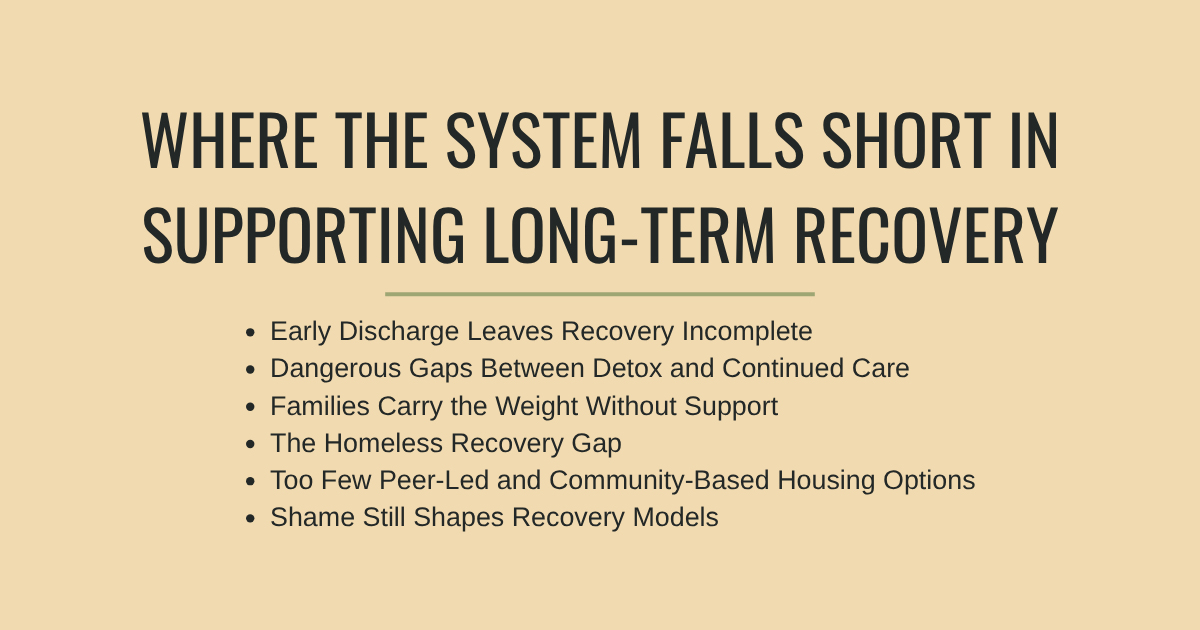
To determine what kinds of improvements are needed, we must examine how the system has failed in the past and continues to do so in the present. Here are some examples of problematic procedures in the modern-day rehabilitation system:
Early Discharge Due to Funding or Policy
According to Harvard Health (HHP, 2021), one of the key steps an individual must take to successfully quit using a substance is to remove oneself from their standard environment. This enables them to form new habits away from situations, people, and potential triggers that could result in a relapse.
When people are forced to leave prematurely, they’re more likely to fall back into old habits, especially without care staff and with the return to the environment that once hosted substance misuse. Unfortunately, plenty of people in recovery have experienced just that.
Whether they can’t keep paying the incredibly high expenditures of the average rehab facility, lack the necessary insurance to support their stay, or have stayed as long as the facility allows, many people are forced to leave before they are ready. Worse yet, they’re leaving without a stable living situation to transition into or the long-term recovery support they need to maintain recovery. This is one of the most significant issues people face when working with standard rehabilitation facilities.
Gaps Between Detox And Integration
When people are forced to leave an addiction rehabilitation program before they have concrete steps in place to help them continue their healing journey, they may be vulnerable to a recurrence (formerly known as relapse). Perhaps even more dangerous are gaps between detox and integration into a treatment program. It’s one thing to move from a previous program directly into a more long-term setup, but gaps in the first stages of addiction treatment can lead to a period where a newly detoxed individual is forced to rely on themselves without medical or psychological care.
People leaving detox may still be going through withdrawal, and without a proper treatment structure in place, they are at risk for a recurrence. In addition, this critical juncture may lead to second thoughts about beginning treatment, as well as posing a physical and mental health risk. This is not a sign of the individual’s failure, but rather the faulty system that did not provide them with streamlined access to continuing care. I know firsthand that these types of gaps can cause enormous setbacks in the recovery journey.
No Support for Families
When you think about addressing SUD, you may envision a singular victim. The truth of the matter is that the problems SUD can cause tend to bleed into the lives of surrounding individuals. Families are often expected to shoulder the majority of the burden of helping their loved one find and access resources to overcome SUD, especially if many of the available options are out of their price range.
This leaves a person freshly out of the withdrawal phase or freshly out of treatment dependent on inexperienced families. In addition, while it may seem harsh, family members have a life beyond helping their loved one recover – even the most compassionate and caring individuals still need to go to work. With no other option, families are often forced to take on the role of transition counselors while leaving a very vulnerable family member home alone. Support matters – not only to the person recovering, but also to their family.
The Homeless Recovery Gap
The Substance Abuse and Mental Health Services Administration, often abbreviated to “SAMHSA” (SAMHSA, 2021), states that roughly 38% of homeless individuals are alcohol dependent, while 26% misuse drugs. It’s a staggering statistic that should not overshadow the fact that unhoused individuals deserve to get well just as much as anyone else. Unfortunately, these individuals will almost certainly return to an unstable environment upon release from rehabilitation programs. As such, they are often thrown right back into a world of drugs, alcohol, and prior triggers.
As previously stated, recurrences become increasingly likely when an individual does not have a secure place to continue their recovery. They also experience obstacles pursuing safer circumstances, as it’s difficult to find and hold down a job when day-to-day life is controlled by an SUD. The standard types of addiction recovery systems may be able to successfully wean unhoused individuals off drugs or alcohol, but it is hard to maintain these results when they don’t have a safe place to continue treatment once they are forced out of the rehabilitation facility.
Lack of Peer-Led or Community-Based Housing Options
Community-based recovery is an incredibly important aspect of SUD recovery, but sadly, there are not many options. For individuals experiencing mental health issues, serious injuries, grief, and more along with SUD, community support is a valuable asset when it comes to pursuing healing. The opportunity to walk alongside others with the same goals, as well as those who have successfully completed their time at a community-based or peer-led house, can be an immense source of encouragement.
Peer-led and community-based housing options are, simply put, living spaces where drugs and alcohol are replaced with positive support and mentorship. This means those on the road to recovery do not need to worry about coming into contact with potential triggers in their living space. Unfortunately, there has been and currently is a severe lack of spaces like this, leaving vulnerable individuals to deal with a world full of temptation and people who are not invested in their recovery.
Shame-Driven Models That Harm More Than Heal
For so long, those who struggle with SUD have been belittled and treated like lesser members of society. Questionable or biased research led to false claims that, if they cared enough, these individuals should be able to resist giving in to temptation. It was even suggested that SUD was a symptom of weak character.
With all we know now, recovering individuals should not be subjected to these mistruths and mistreatment. This is sadly not the case. Many people still feel judged by those around them, leading them to hide their SUD or relapses from the very people who should be supporting them. Shaming an individual does not lead to improvement, but to regret and insecurities. It often drives them further into the depths of SUD.
Where ECHO Steps in
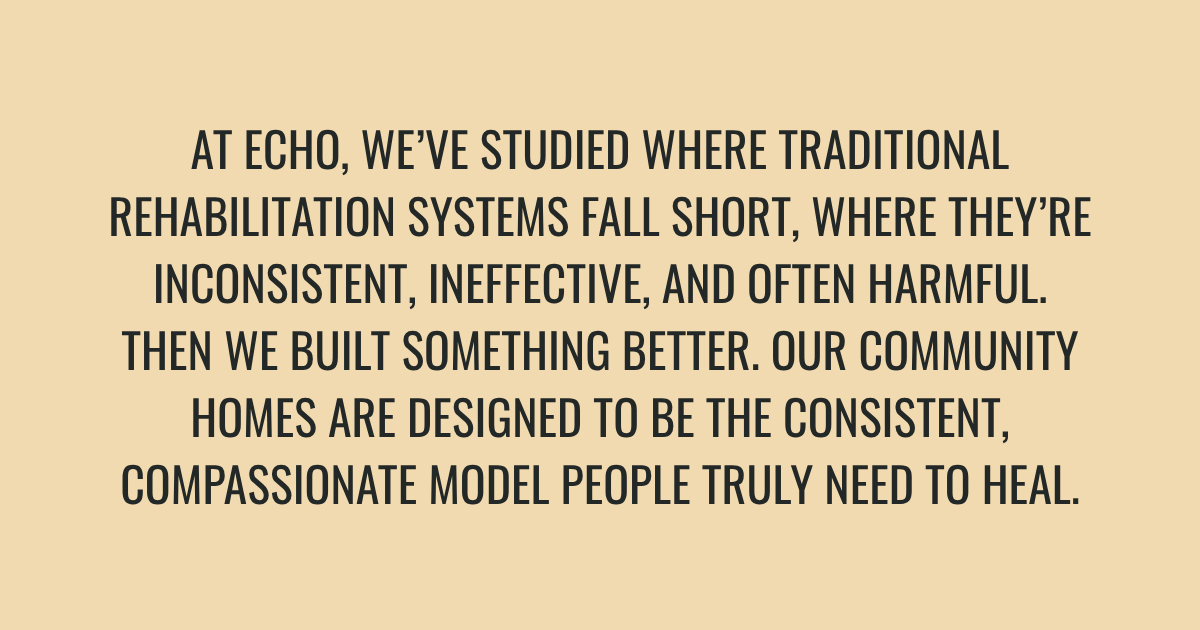
ECHO’s goal to help develop and work toward systematic changes when it comes to rehabilitation care. The team and I have analyzed the various aspects of past and current care options and worked to understand what made their systems faulty, inconsistent, and ineffectual. Then, we did everything in our power to implement a far more successful and consistent model at our community homes.
Here are some examples of the various aspects of recovery we decided to focus on:
- Offering housing support and safe recovery environments
- Implementing community engagement and mentoring
- Providing long-term, wraparound support beyond treatment
- Introducing education, training, and purpose-driven opportunities
- Collaborating with other nonprofits and providers to close gaps
- Creating a model built on connection, compassion, and continuity
When you synthesize all these elements and tailor them to the needs of each individual, a successful recovery is possible. People no longer need to adjust to a one-size-fits-all approach to recovery or hurdle all the gaps it can leave. Instead, they can work collaboratively with people who are eager to find solutions that fit their unique needs.
Just as people receive a unique care plan for a torn ACL or a heart condition, they deserve personalized strategies to help themselves or their loved one overcome substance use disorder. Recovery is possible with the help of intentional care partners and ongoing support. We all deserve to get better, and ECHO is striving to provide resources for a healthier future.
Why the Future Must Look Different
When it comes to developing successful addiction recovery systems, continuous progress is deeply important. Accepting certain truths about recovery is also an essential component of growth. Whether you are struggling with SUD, a loved one needs help overcoming addiction, or you recognize the need to plan for the future of recovery services, it’s vital to accept that real transformation takes time, trust, and an investment from all parties.
Recovery is not a one-size-fits-all system, nor is it linear. While I would love to be able to say that everyone can complete a 28-day program and walk away healthy, this is usually not the case. Even those who have overcome the initial steps of recovery will tell you it is always a battle. Without ongoing support, recovery can quickly revert to recurrence, and without a better framework in place, individuals will be subject to the same cycle of systemic failures every time they make the difficult choice to seek help.
Developing, funding, and normalizing a system based on long-term care, community, and dignity is not only possible, but also deeply necessary. Long-term health and success do not come from quick fixes and outdated views of SUD but from hard work and consistent support. ECHO takes this to heart, which we demonstrate in our drive to create and provide access to community-based housing resources.
Join the Mission

Whether you are struggling with SUD, know someone who is, or are looking to help develop and increase the number of community-based care options, ECHO is ready to walk alongside you. Healing from SUD is a multi-step process that requires support at all stages. Please join our mission to help more people access the support and compassionate, streamlined care they need to not only achieve but maintain recovery.
Contact us today to get involved or help someone in need.
Sources:
- SAMHSA PDF Report: Substance Abuse and Mental Health Services Administration. (2020). Substance use disorders recovery with a focus on employment and education (Publication No. PEP20-06-04-003). U.S. Department of Health and Human Services. Retrieved from https://library.samhsa.gov/sites/default/files/pep20-06-04-003.pdf
- Harvard Health Article: Harvard Health Publishing. (2021, February). Five action steps for quitting an addiction. Harvard Medical School. Retrieved from https://www.health.harvard.edu/diseases-and-conditions/five-action-steps-for-quitting-an-addiction

Experienced Chief Executive Addiction Recovery and Mental Health Professional
Business professional in the Addiction Recovery and Mental Health industry for the past 26 years. Caring, compassionate and strongly motivated to make a difference in the organizations I am affiliated with and welfare of the population we serve. Currently focused on advocating, educating and developing projects leveraging evidence based, real time technology to support individuals in recovery.
